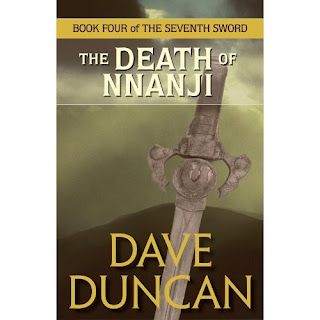Sometimes you do get to go home again.
Dave Duncan’s Seventh Sword trilogy (SST) is one of those rare fantasy series that actually had a lasting impact on me as a reader. First published nearly a quarter century ago the trilogy was an epic fantasy story, starring a contemporary hero and containing an almost sci-fi underpinning to the whole narrative.
It was like writers had finally gotten the message and started making books just for me.
The SST was about the struggle for the soul of the World between the forces of science and ignorance. The World being an Earth analogue, if you squinted your eyes slightly and the light caught it just right, with technology that was roughly equivalent to that of our own Dark Ages. For centuries the World had been governed by a pre-literate priesthood whose edicts were carried out by increasingly corrupt swordsmen.
Into this moral vacuum a group of ruthless scientists emerged, who used their scientific discoveries to cow and control an ignorant populace into believing they are all-powerful sorcerers. In order to combat this threat and return honour to the profession of swordsmen the Goddess relocates the soul of a dying Earth chemical engineer Wallie Smith into Lord Shonsu, one of the World’s greatest swordsmen, and tasks him with the job of bring the sorcerers to heel.
The original trilogy chronicled Wallie’s successful campaign against the sorcerers and wrapped up with the gods withdrawing from the World in the wake of the first signs of the industrial revolution.
THE DEATH OF NNANJI picks up the story again, roughly 15 years after the SST.
Liege Lord Nnanji, Wallie’s protégé from the original trilogy, is now leader of the swordsmen tryst and has nearly succeeded in his mission to rid the world of the amoral sorcerers. However, a co-ordinated assassination attempt on Wallie and Nnanji reveals that the sorcerers are not as close to defeat as they had hoped. Now, with Nnanji fatally wounded, Wallie must retake the leadership of the tryst and finish the job he started 15 years ago. With his son Vixini in tow Wallie plans to cross the face of the World and bring down the sorcerers once and for all.
I was really looking forward to checking in with the world of Wallie and Nnanji again. As I’ve blathered on about in previous posts, I’m a huge Dave Duncan fan and this series was my first exposure to his work. So, Disclosure, I’m carrying a fairly substantial nostalgia torch when it comes to these characters.
Duncan just seems to be one of those writers whose work lends itself to endless speculation about the possibility of new entries. Despite, his clean and direct prose it seems like he can’t help but leave the endings to his books deliberately opened ended. Yes, he’ll wind up the immediate story thread. But there’s also an acknowledgment there on his part that just because this particular tale has wrapped up that doesn’t mean the characters’ lives come screeching to a stop. It feels like he’s handing off the baton to the reader, saying,
“Here you go, I’m done with these guys, why don’t you run with it for a bit and see what happens.”
And with Duncan’s gripping characters and gloriously detailed and open ended worlds in which to adventure in, this kind of endless reader speculation isn’t so much encouraged as it is inevitable.
But while Duncan has shown a willingness to play around for an extended period of time in these worlds its fairly obvious that once he’s closed the chapter on something he’s never really been interested in going back.
Until now.
Spurred on by these messy, unfinished endings, a story like DEATH feels like a natural continuation of what’s gone before rather than a forced entry into a closed system.
In fact its Duncan’s in-depth understanding of the structure and shape of long form writing that makes his work so compelling. Duncan not only knows what ‘rules’ can be broken, but more importantly, he knows when to break them in service of the story. It’s not a silly gimmick, or screwing around for the sake of screwing around, it’s an acknowledgment of the genre’s conventions and motifs and a complete refusal to be unnecessarily bound by them.
Duncan’s treatment of characters is an excellent example of all this. He’s sort of mucking about in the same wheelhouse as GRRM, where the characters worth to the story will have no bearing on how they are treated within it. Very bad things can and will happen to our heros and major characters can and will be treated like red shirts, summarily dispatched with no pomp and circumstance whatsoever.
Take Krandrak, a sorcerer that Duncan builds up throughout the course of the novel as a ruthless and unprincipled master strategist and one of the book’s big bads. Duncan puts a lot of work into positioning the character and managing reader expectations for a climactic battle and then discards him out of hand in less than a paragraph. I had to read and reread a measly half dozen sentences to make sure I was following the action properly and hadn’t glossed over some important aspect that I had apparently missed.
It’s this willingness to mix things up, to inform the reader that there are no sacred cows at play here that keeps Duncan’s work so interesting and enjoyable to me.
THE DEATH OF NNANJI is a rare opportunity for fans to check in with characters and a world whose canonical appearances had seemingly run their course. If you’ve never checked out the Seventh Sword trilogy now is the perfect time to run out and see what the fuss is all about. Duncan has created strong and moving characters whose fate you can’t get help but get caught up in and a world as rich and layered as our own.


No comments:
Post a Comment